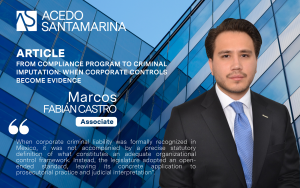
As civilizations develop and progress, it is important that our law does as well. It is essential that the law be adapted and updated in accordance with new circumstances and changes in society. Since the beginning of civilization, people have witnessed various events and revolutions that have led to changes in our way of seeing life and living it. A clear and recent example of this is the Covid-19 pandemic. Faced with an event of such magnitude, which changed the history of mankind, we find ourselves in the need to elaborate modifications in the legislation, in order to allow society to follow its course.
In this regard, on March 9, 2022, a bill was filed before the Chamber of Deputies, with the purpose of amending certain articles of the General Law of Mercantile Corporations. This initiative allows members and shareholders to hold meetings by electronic, optical or any other technology. As a result of the health situation and technological advances, alternatives to the meetings are proposed in order to speed up and facilitate the holding of meetings and decision making in commercial companies.
On the one hand, in the case of corporations, the aforementioned law expressly establishes that shareholders’ meetings may be held only at the corporate domicile. The discussion lies in the interpretation of the legal text, since the holding of shareholders’ meetings through electronic means may or may not be considered as held at the corporate domicile, depending on whether the physical presence of the shareholders is required. The present reform establishes that the holding of meetings by telematic means should not be understood as being held outside the corporate domicile, so that in this respect, there is no inconvenience whatsoever with this initiative of law and the issue is clarified. However, I believe that the real challenge of the reform is the safeguarding of legal certainty and security, for which it is essential to establish efficient mechanisms that allow access to the assemblies virtually, and that, in turn, effectively accredit the identity and vote of the participants.
On the other hand, in relation to Limited Liability Companies, the General Law of Mercantile Companies does not establish any provision referring to the obligation of the partners to hold meetings at the corporate domicile, so there is no impediment whatsoever for these to be held, derived from the initiative of the law, through telematic means.
Notwithstanding the foregoing, the reform provides, at the option of each participant in the meeting, for his or her intervention in person or by electronic, optical or any other technology, both having the same validity. Personally, I consider that the hybrid session modality, i.e., part of the participants in person and the other part virtually, is an alternative for adopting resolutions in a faster way that, at the same time, seeks to preserve the health of the participants in cases of health emergencies. In spite of this, the risk of foreseeing this modality is the difficulty of communication and discussion in the celebration of assemblies. There is no doubt that interaction and face-to-face contact between people is a factor that can contribute to better negotiation and, consequently, to better decision making.
Finally, I would like to make special mention of the fact that the incorporation of sessions carried out by electronic means does not prevent or restrict the right to hold face-to-face meetings, or to adopt resolutions outside the meeting, but only provides an additional option for holding such meetings. In my opinion, the change and the need to hold meetings by electronic means in commercial companies is evident, and the law cannot ignore this reality. Therefore, I insist that as our society evolves, so must the law. The corporate practice at Acedo Santamarina, S.C. is committed to promoting the digitalization of law through this type of legal initiatives, which facilitate decision-making in commercial companies.
By Ana Martha Patterson Escalante




